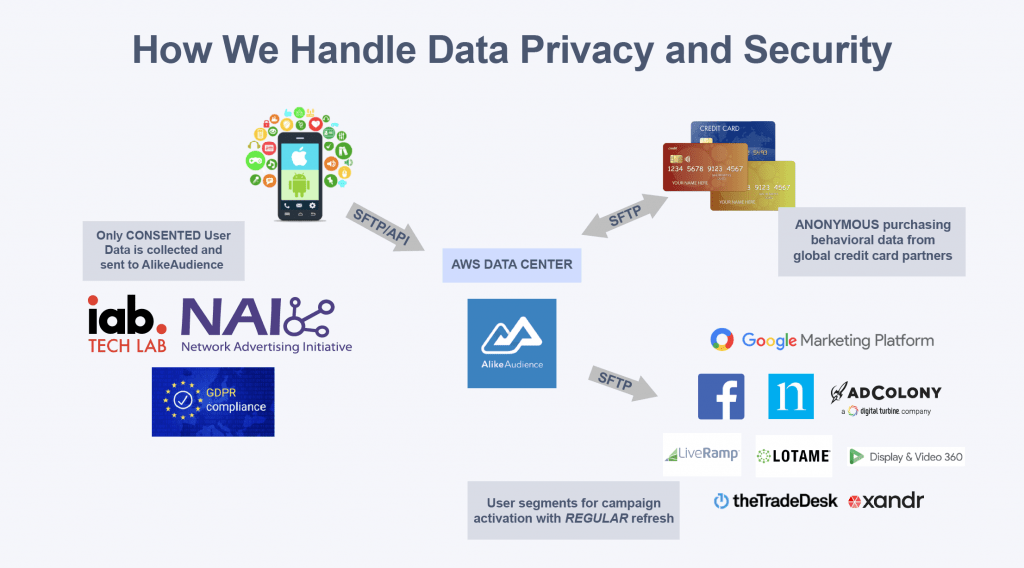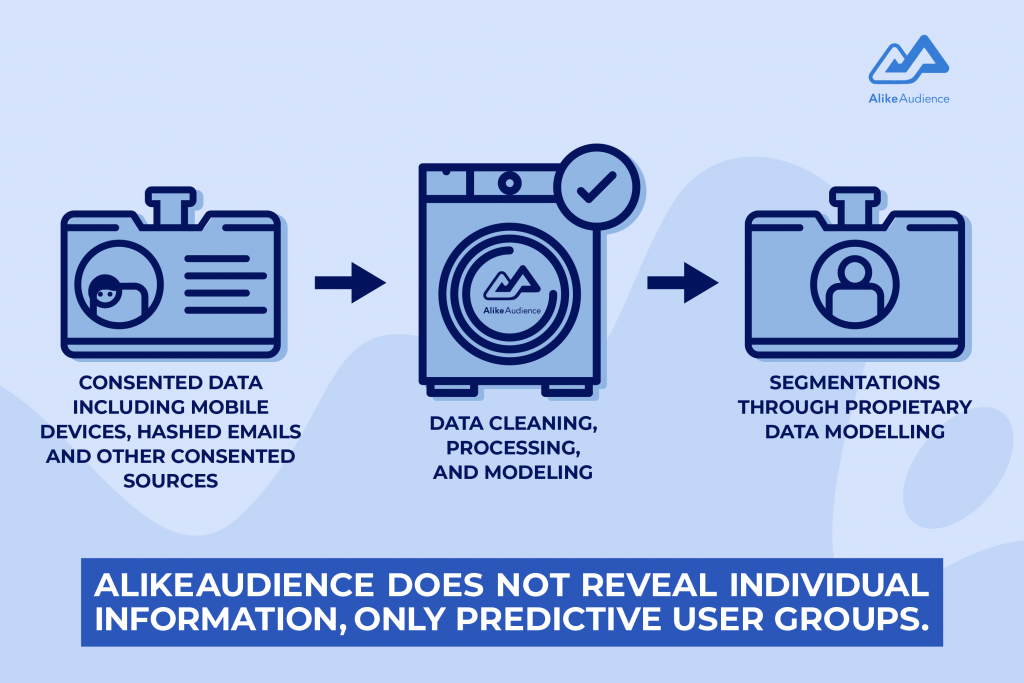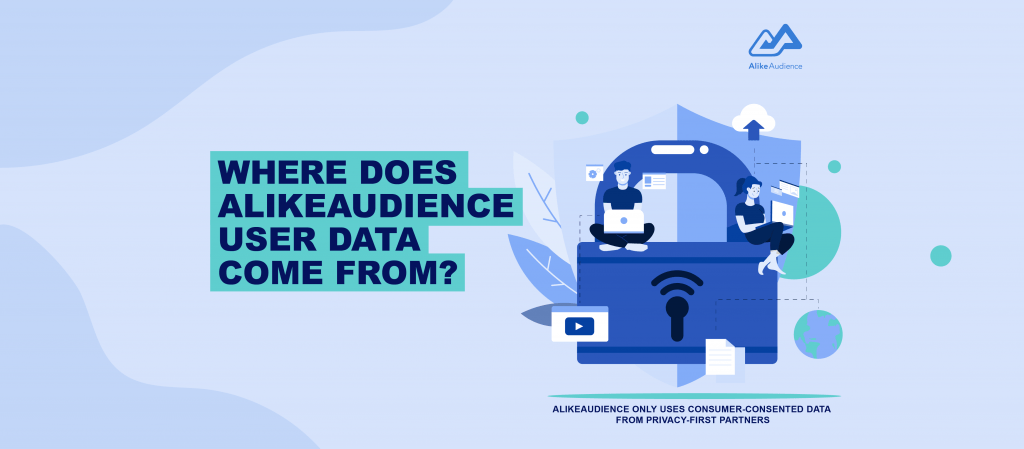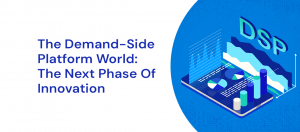Recent political and social issues have amplified privacy concerns around data vendors. AlikeAudience, a privacy-first audience segmentation company, only collects consented user data from our data partners.
AlikeAudience licenses, processes, and onboards consented data, such as mobile advertising IDs (MAIDs), hashed emails, and other consented Personally Identifiable Information (“PII”).
AlikeAudience cleanses and processes consented data into predictive attributes. We segment users based on these attributes, and each segment contains at least 1000 user identities, hashed, according to each DSP platform's requirement, industry standards, and privacy laws. This is how we form the audience segments we offer today.
The health audience segments at AlikeAudience, particularly pregnancy-related segments, are not collected from transaction or credit card data. Instead, consumer and mobile app data are processed to offer predictive user segments.
AlikeAudience only sources consumer-consented data

AlikeAudience only works with qualified data originators who license consumer-consented information for the legitimate use of programmatic advertising. Our audience data comes from consumers who provide emails on websites or agree to cross-app-tracking on their phones. You may opt out at any time via the Network Advertising Initiative (NAI) Code of Conduct. For more details, please visit our privacy policy page.
This means that when these consumers provide their emails on websites or agree to cross-app-tracking on their phones, they understand and agree the data to be used for the purpose of programmatic advertising.
AlikeAudience only sources consented mobile advertising IDs (MAIDs) and consented emails from trustworthy, industry-leading, and privacy-first partners.
Mobile advertising IDs are system-generated numbers assigned to digital devices, such as phones and tablets. Each of these IDs comes with a number of attributes from which data is analyzed and modelled into predictive consumer behavior, such as purchase intent and interests.
AlikeAudience only collects MAIDs that have been opted in by users themselves. These MAIDs are also completely pseudoanonymous: they don’t reveal any personal information like full names and dates of birth, and they cannot be tracked down to any individual person.
“Hashed emails” that we source from our data partners are email addresses that have been transformed into unrecognizable characters using hashing algorithms. Once an email address has been hashed to conceal its original form, it cannot be reversed. This means your email addresses are completely concealed from parties who process the hashed emails.
We strictly follow the 2020 Network Advertising Initiative (NAI) Code of Conduct for all of our segments, including our health-related audience segments. The Code of Conduct specifically prohibits data providers from collecting sensitive health information, such as medical records and online browsing behaviors, without opt-in consent.
AlikeAudience also fully complies with General Data Protection Regulations (GDPR) and California Consumer Privacy Act (CCPA) requirements. These two landmark data privacy regulations grant consumers greater transparency from companies for better user data collection and management.
If you’d like to opt out of targeted advertising on your mobile devices, simply enable:
• “Limit Ad Tracking” setting on iOS mobile devices.
• “Opt out of Ads Personalization” setting on Android devices.
For details, please visit our privacy policy page.
AlikeAudience does not reveal individual information, only predictive user groups

Our data processing model is completely algorithm-based, predictive, and privacy-compliant. Although we collect consented data from multiple sources, our processed data does not reveal individual records. Only predictive and aggregated insights are shared in the form of user segments with advertisers.
After producing segments through proprietary data modeling, our partners work with us to adopt our processed data, in the form of audience segments and the proprietary identifier solutions developed by these partners. This includes TTD (UID2.0), LiveRamp, and Yahoo ID. These IDs are named as pseudonymous IDs. Pseudonymization is a de-identification procedure where personally-identifiable information is replaced by random identifiers.
To clarify, when we refer to non-PII, we mean datum that does not identify a particular individual, which includes anonymous IDs associated with a user’s online activity, such as browsing behaviors.
Through industry-leading identity technology, we protect hashed emails from dictionary attacks, in case the attacker already owns a list of emails or deploys brute-force attacks.
Our health segments are formed from predictive data modeling to get aggregated insights from consumer and app user data, not individual credit card transactions.
Predictive modeling is a statistical technique that uses machine learning and data mining to predict future behaviors based on historical data. We look at opted-in MAIDs to analyze different kinds of consumer and app user behaviors, and model our audience segments based on this analysis. Hence, our segmentation is predictive with scale.
For example, our pregnancy-related audience segments are purely predictive and aggregated, and do not reveal individual transactions.
How AlikeAudience use and share data
After processing data, no one can access concealed personally identifiable information (PII), like addresses and email addresses.
AlikeAudience has stringent measures in place to decide who has access to our customer data. We only work with pre-selected, responsible partners who are built for privacy, to avoid exploitation of personal information.
We follow the best practices of global leaders in the AdTech industry, such as Google's demand-side platform, Display & Video 360 (DV360), which requires advertisers to hold certifications to advertise healthcare-related content on open exchanges and YouTube.
Our founders are also active members of the IAB Tech Lab, a non-profit consortium responsible for providing standards, software, and services for the digital media ecosystem.
Any data that is stored on AlikeAudience’s servers is treated as confidential under ironclad security and is not generally available to the public.
For more information, please visit us at www.alikeaudience.com or contact our data strategist here.


 12/10/2024
12/10/2024
